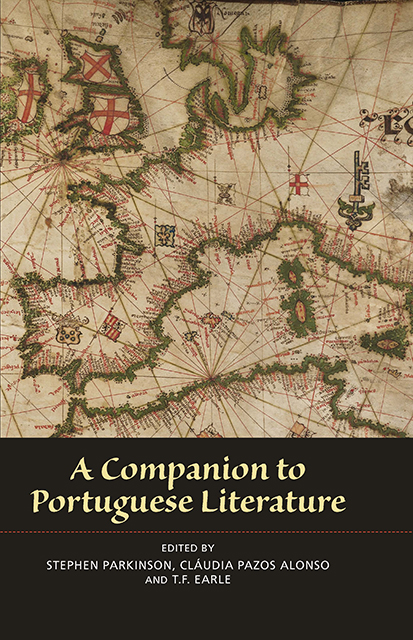Book contents
- Frontmatter
- Contents
- Acknowledgements
- Notes on the Contributors
- Introduction
- 1 Eight Centuries of Portuguese Literature: An Overview
- 2 The Medieval Galician-Portuguese Lyric
- 3 Fernão Lopes and Portuguese Prose Writing of the Middle Ages
- 4 Portuguese Theatre in the Sixteenth Century: Gil Vicente and António Ferreira
- 5 The Lusiads and the Literature of Portuguese Overseas Expansion
- 6 Lyric Poetry in the Sixteenth Century
- 7 The Seventeenth Century
- 8 The Eighteenth Century
- 9 Almeida Garrett: Founder of Modern Portuguese Literature
- 10 The Transition from Romanticism to Realism: Alexandre Herculano, Camilo Castelo Branco and Júlio Dinis
- 11 Eça de Queirós: A European Writer
- 12 Fernando Pessoa and the Modernist Generation
- 13 Narrative and Drama during the Dictatorship
- 14 Women Writers up to 1974
- 15 Writing after the Dictatorship
- 16 Portuguese Literature in English Translation
- Index
Introduction
Published online by Cambridge University Press: 03 March 2023
- Frontmatter
- Contents
- Acknowledgements
- Notes on the Contributors
- Introduction
- 1 Eight Centuries of Portuguese Literature: An Overview
- 2 The Medieval Galician-Portuguese Lyric
- 3 Fernão Lopes and Portuguese Prose Writing of the Middle Ages
- 4 Portuguese Theatre in the Sixteenth Century: Gil Vicente and António Ferreira
- 5 The Lusiads and the Literature of Portuguese Overseas Expansion
- 6 Lyric Poetry in the Sixteenth Century
- 7 The Seventeenth Century
- 8 The Eighteenth Century
- 9 Almeida Garrett: Founder of Modern Portuguese Literature
- 10 The Transition from Romanticism to Realism: Alexandre Herculano, Camilo Castelo Branco and Júlio Dinis
- 11 Eça de Queirós: A European Writer
- 12 Fernando Pessoa and the Modernist Generation
- 13 Narrative and Drama during the Dictatorship
- 14 Women Writers up to 1974
- 15 Writing after the Dictatorship
- 16 Portuguese Literature in English Translation
- Index
Summary
This Companion to Portuguese Literature is the first in English. It is intended as a companion in a literal sense – a guide, friendly and accessible, but we hope authoritative, for readers to take with them on one of the most interesting but least known literary adventures that Western Europe can offer. The book has been written for readers who, for whatever reason, are new to Portuguese literature, who would like to have some idea of the terrain in advance, but who do not expect an answer to every question. So each chapter provides an outline of the work of a writer or group of writers, and establishes the main issues in view, in a way that encourages further exploration. At the same time it gives a clear overview of areas which undergraduate and graduate students may be about to study in greater depth.
This is a Companion, not a history or dictionary of literature. There have been histories of Portuguese literature by English writers – for example, Aubrey Bell's now quite outmoded Portuguese Literature of 1932. There are other, and much more distinguished histories in Portuguese. The best-known modern one is A. J. Saraiva and Óscar Lopes's brilliantly polemic História da Literatura Portuguesa of the 1950s. These writers’ left-wing political convictions led them to shed light on many neglected matters, but they were extremely partial. The more recent Revisionist History of Portuguese Literature, in English but written mostly by a group of Portuguese scholars, also seeks to challenge conventional wisdom. In a Companion, however, unlike a history, there is no single point of view, apart from the wish to guide readers on their way. In any case, in a book with eighteen authors editorial single-mindedness is impossible.
In recent years Portuguese scholars have produced a number of excellent dictionaries of literature and of the work of individual writers. A list of some of them is given at the end of this Introduction. Compilers of dictionaries normally try to give a complete coverage of their subject, but that is not the ambition of this book. After all, no one on a journey would tolerate a companion who insisted on explaining everything, without distinguishing the wood from the trees.
Information
- Type
- Chapter
- Information
- A Companion to Portuguese Literature , pp. xi - xviPublisher: Boydell & BrewerPrint publication year: 2009
